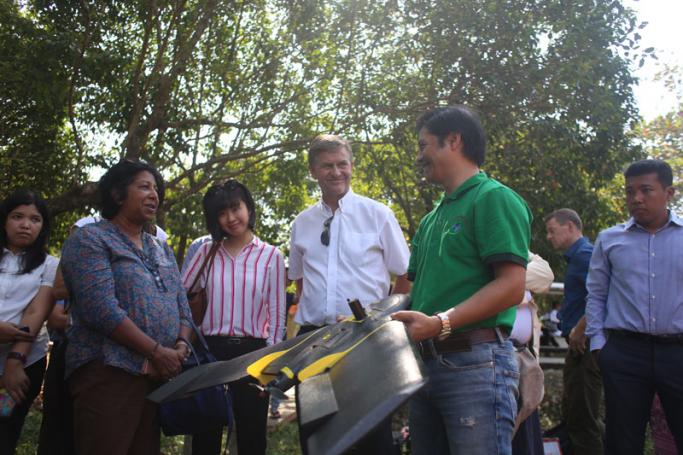A visiting UN official says Myanmar has an “enormous opportunity” in pursuing an environmentally sustainable path to development in the coming years.
Head of UN Environment and UN Under-Secretary-General Erik Solheim is visiting Myanmar to address the ASEAN Institute on the Green Economy conference, meet senior government officials and speak with members of the business community and civil society, including State Counsellor Aung San Suu Kyi.
On February 7, he took reporters to visit a mangrove conservation site near National Races Village in the Yangon Region.
Mr Solheim told Mizzima that no one should have to choose between the environment and development as the two can go hand in hand.
“We are looking to have UN environmental support for Myanmar utilising the enormous opportunity for going green and develop the land at the same time, promoting renewable energies rather than going into coal, to make jobs and promote prosperity,” he said.
Mr Solheim stressed the economic and employment benefits of taking a “green” path to development, rather than the typical default settings that relied on dirty and polluting fuels such as coal and environmentally-damaging resource extraction.
“Ecotourism or green tourism will brings thousands or hundreds of thousands of visitors and will protect the land and the beauty of the forest and the coast, prevent plastic pollution, and in cities encourage them to go green, so that there will be less pollution and less health risk and a better life all at the same time,” he said.
The UN environment chief stressed that the “green” path to development for a country is just coming out of decades of “political turmoil” providing a win-win situation.
The UN representative said his organisation was doing what it can to help Myanmar.
“We discussed that yesterday with Aung San Suu Kyi and also a number of other leaders,” Mr Solheim told Mizzima. “We can provide the best examples of what has gone well in India or Germany or Africa and provide that example for Myanmar. We are creating global platforms where this can be discussed, bring expertise, practical things, where there is a lot of interest.”
As he noted, China has set up a Belt and Road Initiative, which is a huge investment programme in Asia, and this “can work with China and Myanmar so that they can go green, so investments in solar and wind, to make it very environmentally friendly.”
Myanmar is both vulnerable to the negative effects of climate change and currently lacks capacity in terms of systems.
“Myanmar surprisingly is one of the really vulnerable countries in the world prone to climate change because Myanmar is so big, so varied in nature, but you have a very, very long coastline, which is vulnerable to cyclones,” the UN official said. “We all remember (cyclone) Nargis which killed more than 100,000 people.”
As he pointed out at the mangrove forest project site, the prospects for growing and renewing mangrove plantations were exciting, in part due to new technology and a growing awareness of how to protect the environment and people against the negative effects of storms and cyclones.
He said drones are now being used to plant mangrove forests, a drastically improved situation when compared to using manpower.
Tree planting can be carried out on a much larger scale because humans can only plant a few mangroves saplings a day, whereas a drone can plant more or less endlessly, and they can “replant” and make large areas green over time.
Mr Solheim is promoting the value of sustainability in helping social equity, economic development and peace.
The head of UN Environment is the former Minister of Environment and International Development of Norway, and most recently headed the Development Assistance Committee of the Organisation for Economic Co-operation and Development. Mr Solheim is also an experienced peace negotiator, having acted as the main facilitator of the peace process in Sri Lanka, and participated in others in Myanmar, Sudan, Burundi and Nepal.












